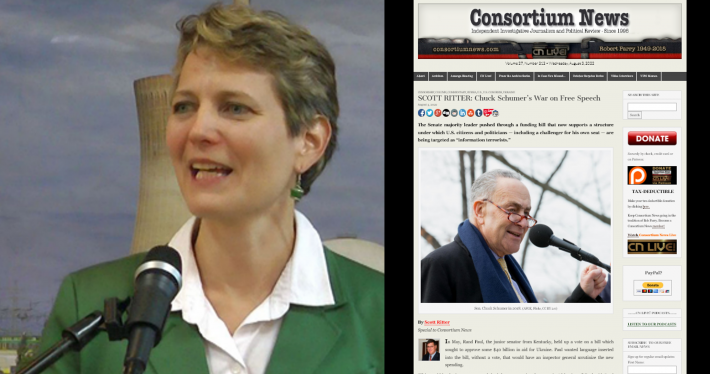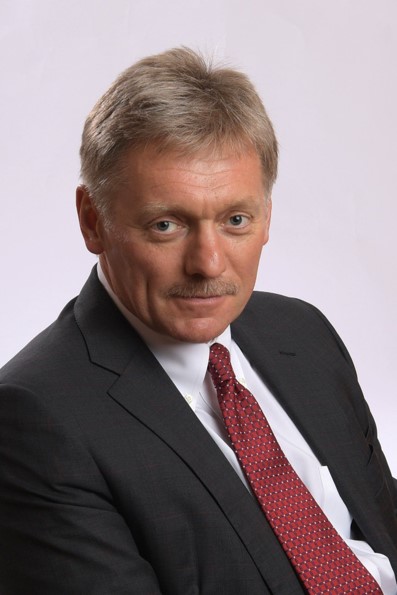July 31—Although the Nazi-like blacklist published by Ukraine’s Center for Countering Disinformation (CCD) on July 14, fingering 78 prominent international individuals as purveyors of alleged “Russian propaganda,” has received wide coverage in western news outlets, including leading corporate media, all the coverage, with the single exception of that of Executive Intelligence Review.
The reportage has left out the most important truths behind this despicable attack by the U.S., UK and NATO funded operation in Ukraine: first, that the primary target is the Schiller Institute, given that the first thirty names on the list were speakers at Schiller Institute conferences in 2022, with Helga Zepp-LaRouche, the founder of the Schiller Institute, appearing prominently on the list; and, secondly, that on the same day the list was released, the acting head of the CCD, Andriy Shapovalov, in an address to a round table on countering disinformation, said that those on the list were “information terrorists,” and that “Information terrorists should know that they will have to answer to the law as war criminals.” That roundtable was organized in part by the U.S. Civilian Research and Development Foundation with the support of the U.S. State Department.
The Danger to Those Targeted
This is not only a threat to the safety and even the lives of those placed on the list, it also opens the door for the British and U.S. governments and their human rights mafia to bring the International Criminal Court and other imperial legal institutions to bear.
Scott Ritter, the outspoken former Marine Corps intelligence officer and UN weapons inspector, who also appeared on the CCD list, wrote an open letter to his Congressional representatives (U.S. Senators Chuck Schumer (N.Y.) and Kirsten Gillibrand (N.Y.), and Rep. Paul Tonko (N.Y.)), demanding they “take the appropriate action necessary to ensure that funds appropriated by the United States Congress are not used to suppress the free speech rights afforded to citizens of the United States, including myself, by the First Amendment of the United States Constitution.” Ritter notes that all three of them supported H.R. 7691, “The Additional Supplemental Appropriations Act of 2022,” which provides funding for the Ukrainian government and its Center for Countering Disinformation that has targeted him.
Ritter writes: “As a constituent whose name has appeared on a so-called ‘blacklist’ published by the Ukrainian Center for Countering Disinformation, my personal and professional life has been, and continues to be, detrimentally impacted by the chilling effect of being labeled a ‘Russian propagandist’ for simply exercising the right to free speech guaranteed by the United States Constitution. Moreover, Ukraine has a history of converting ‘blacklists’ of this nature into ‘kill lists,’ where those who speak out against the policies of the Ukrainian government are being murdered or threatened with violence. I am certain you agree with me that Congress cannot be in a position where, through its actions, foreign governments are provided the means to intimidate citizens of the United States from exercising their Constitutionally protected rights regarding free speech.”
Schumer’s Role in Targeting his Opponent Through Ukrainian Nazi Lies
Even more threatening to U.S. law and the rights of its citizens is the fact that Diane Sare, officially on the ballot as a LaRouche candidate for the U.S. Senate seat in New York State, now held by Chuck Schumer, is also targeted on the Ukraine hit list. Thus, Schumer is openly supporting the funding of a foreign organization which is dangerously targeting his opponent in an extremely important political election in the United States—an interference in the American electoral process that puts to shame Schumer’s discredited claim of Russian interference in U.S. elections.
In a personal response issued by Sare on July 31, she states: “I would like to underscore what Scott Ritter has said, and ask the additional question of Senate Majority Leader Schumer, ‘Is it your intent to silence my voice in an indirect, but menacing fashion, by voting to fund Ukrainian civil servants who have stated that I should be arrested for war crimes?’ ”
According to the CCD, the July 14 conference was “supported”—that is, funded—by the State Department, while the Ukrainian office of the U.S.-headquartered Civilian Research and Development Foundation (CRDF Global) was responsible for organizing the event, along with several Ukrainian outfits. Funders of CRDF Global, a public-private organization “founded in 1995 in response to the collapse of the Soviet Union,” include the State Department, State’s Bureau of Educational and Cultural Affairs, the Defense Department and its Defense Threat Reduction Agency (DTRA), and the UK government and its Counter Proliferation and Arms Control Centre. CRDF Global, led and staffed primarily by people with long careers in the U.S. MICIMATT (Military-Industrial-Congressional-Intelligence-Media-Academia-Think-Tank complex), has “Countering Disinformation and Cyber Security” as one of its “strategic areas,” along with nuclear proliferation, bioweapons lab operations, and a few other areas. CRDF Global’s Eastern Europe and Eurasia Hub has operated out of Kiev since 1997.
In April 2022, U.S. Department of State Senior Assistance Coordinator for Ukrainian Affairs, David Schlaefer, played a leading role in a meeting of the “national cybersecurity cluster” held by the National Cybersecurity Coordinating Center of Ukraine’s National Security and Defense Council, with support from CRDF Global and the U.S. State Department Office of the Coordinator for Assistance to Europe and Eurasia, according to CRDF Global. See this CRDF Global news release.
Thus, the State Department “knew or should have known” of the threats issued at the event they sponsored. The question arises: Were any State Department officials involved in drawing up the hit list and encouraging its publication? It is clear that, should anything happen to any of the 78 people included on the Ukrainian hit list, the U.S. State Department could be held co-responsible for that harm.
















